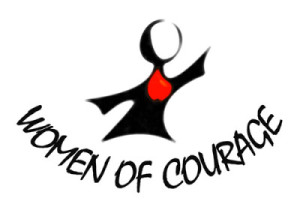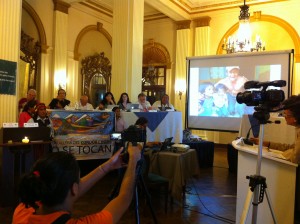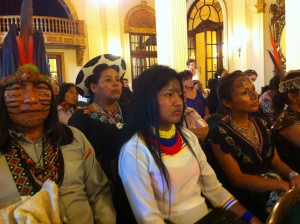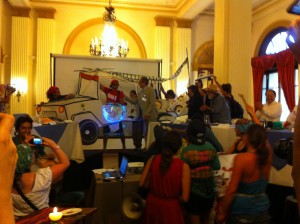Tribunal at Peoples’ Summit calls for a UN Declaration on the Rights of Nature

On my first day at the Peoples’ Summit on COP20 in Lima, I participated in the first day of the Tribunal on the Rights of Nature, organized by the Alliance of the Rights of Nature, which includes KAIROS partner Acción Ecológica. “This is an ethical Tribunal,” explained the organizers. “We are not going to wait for the rights of nature to be addressed by the United Nations and States. These issues need to be addressed now. We need a Universal Declaration on the Rights of Nature.”
 There is a history of ethical tribunals on the rights of nature. This is the 6th, and the third outside Ecuador. The structure of the Tribunal involves the presentation of twelve cases, including testimony from expert witnesses and victims. The jury is made up of high profile Indigenous leaders, academics, artists, church leaders and environmentalists, including Tantu Cardinal from Canada, and Tom Goldtooth, Executive Director of the US-based Indigenous Environmental Network (IEN).
There is a history of ethical tribunals on the rights of nature. This is the 6th, and the third outside Ecuador. The structure of the Tribunal involves the presentation of twelve cases, including testimony from expert witnesses and victims. The jury is made up of high profile Indigenous leaders, academics, artists, church leaders and environmentalists, including Tantu Cardinal from Canada, and Tom Goldtooth, Executive Director of the US-based Indigenous Environmental Network (IEN).
The Tribunal began with the recognition of the rights of nature. Indigenous leaders were called to give evidence. “A society that is based on extraction is far away from this understanding of nature. Much of the Western world has lost this ability, “ said Patricia Gualinga, a Sarayaku leader. “As Indigenous peoples we still have this understanding and relationship with nature. But all signs are obvious and she is speaking loud and clear.”
 We then heard about legal advances on the right of nature. We learned about the experience of Bolivia, which has a law on the rights of nature, and Ecuador, where the constitution recognizes the rights of nature. The right to nature has existed for centuries in Indigenous knowledge, relationships with nature and world view. These are an effort to enshrine them in articles and law. At the same time, we were given examples of how both the Ecuadorean and Bolivian government are violating their own laws with extractive policies and development.
We then heard about legal advances on the right of nature. We learned about the experience of Bolivia, which has a law on the rights of nature, and Ecuador, where the constitution recognizes the rights of nature. The right to nature has existed for centuries in Indigenous knowledge, relationships with nature and world view. These are an effort to enshrine them in articles and law. At the same time, we were given examples of how both the Ecuadorean and Bolivian government are violating their own laws with extractive policies and development.
In his opening address to the jury and audience, Alberta Acosta, president of the jury and former Minister and associate of Acción Ecológica, drew attention to two gaping absences at the Tribunal: Shuar leader, Jose Isidro Tendetza, and the Yasunidos. I spoke about the alarming and tragic reasons for these absences in my first blog.
Jose Isidro was expected at the Tribunal as a witness in the case being presented on the Mirador Mine. As I wrote in my blog, Jose was killed and his body was identified on Dec 3, two days before the Tribunal. Jose was a Shuar leader and an outspoken and visible critic of mining operations in his community. Acosta asked the jury and audience to remember Jose with applause, not silence, to show that his voice will not be silenced.
Later, as an homage to Jose, other members of the community presented the Mirador mine case. They spoke about his courage, tenacity and fearlessness when confronting the mining company, but also about his kindness and tenderness with his grandchildren. Jose had originally worked for the mine, but quit and became an outspoken critics when he began to see the impact on his community. He refused to leave his land and two years ago his crops were burned, allegedly by supporters of the mine.
We learned about the many irregularities around his death. His body was buried by the Prosecutor and police before it was identified by his family. “Did Jose die defending the rights of nature?” asked jury member Tom Goldtooth.
Domingo Ankuash, who spoke in Jose’ s place, told the jury about the beauty and biodiversity in the Condor where the mine is located. It is one of the most biodiverse regions in Ecuador. “For us, the waterfalls are sacred,” he said. “We have an alliance with nature. We depend on it.” This alliance is threatened by the mine.
Gloria Chicaiza from Acción Ecológica spoke of the importance of presenting this case in the context of the COP20. Jose was a defender of the rights of nature and biodiversity. The United Nations is supposed to be a regulator and defender of these rights.
 The other absence that Acosta talked about in his opening speech was the caravan of Yasunidos whom I also wrote about in my first blog. I am happy to say they arrived in mid afternoon on the first day. When they made a dramatic and celebratory entry into the chamber both the jury and audience jumped to their feet and applauded. The case of the Yasuni will be presented on the second day of the Tribunal.
The other absence that Acosta talked about in his opening speech was the caravan of Yasunidos whom I also wrote about in my first blog. I am happy to say they arrived in mid afternoon on the first day. When they made a dramatic and celebratory entry into the chamber both the jury and audience jumped to their feet and applauded. The case of the Yasuni will be presented on the second day of the Tribunal.
These are just two of twelve cases that will be heard at the Tribunal. The jury will then deliver a verdict. Although the verdict will not have legal “teeth”, it is a moral verdict based on the testimonies of expert witnesses and victims of cases of violations of the rights of nature, which are excluded from current legal systems. The verdict will be used to advocate for the rights of nature at the United Nations and with States.
COP20 should be a forum where the rights of nature are recognized. These cases demonstrate that this is not an academic argument. There are real impacts and victims. Until the rights of nature are seen as integral to addressing climate change, the future of the planet continues to be at risk.
Read a December 6, 2014 article in the Guardian about Jose Tendetza’s murder.








